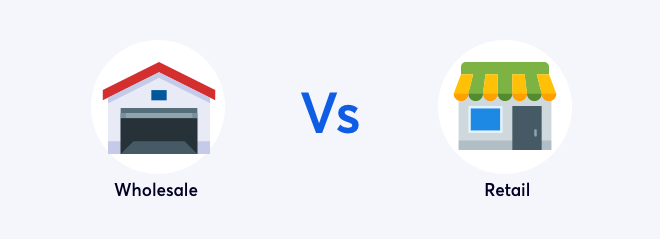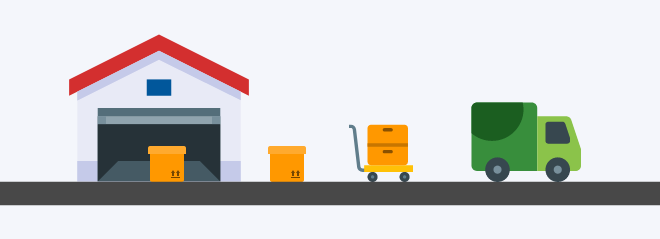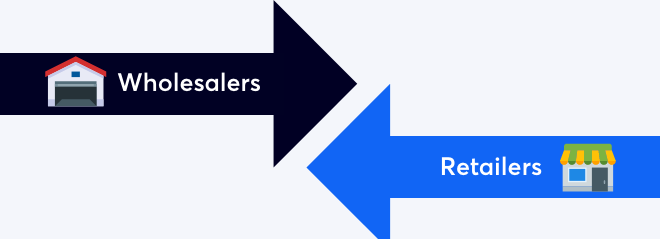Retail Store Design Consistency Brand Video
Many businesses wonder what really sets wholesale business and retail companies apart from one another, so we've dedicated an entire chapter in this article to take you through the pros and cons of each business model in more detail.
Wholesale vs Retail: Which one is for you?
You have a product, and it's a good one. You may be looking at the best way to take that product to market, or you may already be selling it in small quantities and are now planning for growth.
Essentially there are two main ways to sell your product – either as a wholesaler, or as a retailer. Each has its benefits and potential pitfalls. When choosing the most appropriate avenue to market, you must consider which model fits best with:
- Your strengths and personality as a business owner
-
The brand identity of your business and its product or products
-
How best to reach your target market
Let's discuss this in detail…
What's in this article?
You have put your all into developing your business and you want your product to get to its target market in the most effective way possible. The question is: do you want to be a retail business, or join the wholesale market?
The choice of retail vs wholesale, or even a bit of both is a big decision. Read this article to discover the options available to reach your customers and help decide what is the best business model for your business.
We will focus on:
-
What are the differences between wholesale suppliers and retail businesses?
-
Why being a wholesaler might suit you?
-
Why being a retailer might suit you?
-
Can wholesalers sell products via retail and vice versa?
-
What do you need to know for multichannel retailing?
-
What else do you need to consider?

Wholesale vs Retail

First things first, what is the difference between a wholesale and a retail? And why are those differences important?
What is wholesale?
A wholesaler is a person or company who sells products in bulk to various outlets or retailers for onward sale, either directly or through a middleman. Wholesalers are able to sell their products for a lower price as they are selling in bulk, which reduces the handling time and costs involved.
They usually provide large quantities of goods, but can take on orders for smaller quantities as well. The wholesaler may also be the manufacturer or producer of the product, but they don't have to be.
What is retail?
A retailer is a person or a company who sells products directly to their customers for a profit. The retailer may be the manufacturer of the product, or may acquire relevant products from a distributor or a wholesaler. The products they sell will be at a higher price than they would be from a wholesaler, due to markups.
Why Wholesaling Might Suit You

Being a wholesaler gives you access to a diverse range of outlets and allows you to reach a large customer base. Offering your product as wholesale allows a larger audience access to your wares, therefore you are able to grow your business quickly.
This can drive interest for your product and can make you attractive to retail stores who can see that there is a solid audience for your goods and are more likely to want to stock your product.
1. Brand Awareness
Acting as a wholesaler is a great way to build awareness for your product. Instead of consumers having to purchase exclusively from a particular shop, be it an ecommerce store or brick and mortar, consumers can see your product in a variety of outlets. It can allow a wide range of consumers who might otherwise not have been aware of your product to build a relationship with it.
2. Drop-Shipping
As a wholesaler, you can take advantage of a method of selling known as drop-shipping. A retailer or merchant sells the product, but doesn't own the inventory. Instead, the order comes directly through to you and you dispatch the product directly to the customer. As a drop shipper, you gain the advantages of retail sales (such as targeted branding and a direct line to the customer), while a specialist retailer handles the front end of things. You retain ownership of the inventory, though it does add complexity to your supply chain.
When drop-shipping, the system at the center of your business should offer you the flexibility of being able to differentiate your drop-ship orders from others. Whether this be in the form of a drop-ship symbol against orders, a different order status or a report filter, you should be able to separate out these orders at a glance, quickly and easily. This allows for simple and effective reporting, as well as your team being able to process the orders quickly and in the correct way, according to your drop-shipping workflows.

3. Global Expansion
When selling wholesale products, it's much faster and easier to expand into global markets. Any growth and expansion is defined primarily by your relationship with those clients who buy goods from you. If they sell globally, then so will you as you're just getting the goods to where they need to sell them.
Ensure your accounting system is setup to allow for multicurrency transactions so that you can clients can place purchase orders in multiple currencies.
Another part to this is that when selling via wholesale, you will be shipping your goods internationally as one large container, as opposed to sending hundreds of individual retail packages. For a small business looking to grow, this can be a cheaper way of selling internationally.
Potential Pitfalls

A wholesaler is not able to be as responsive to the changing needs and desires of the end-user. Whereas a retailer is at the front line of building a relationship with the consumer, a wholesaler is at least one step away and relies heavily on market research and feedback from retailers to stay ahead of the game.
1. Retaining Brand Identity
By trusting your product to a retailer, you're putting faith in their ability to retain the brand identity of your product. You don't want to supply something to Walmart, and have consumers think of it as Walmart's own product!
It may not always be possible to have control over how your product is merchandised, any discounted prices they choose, or what competitive products it's displayed alongside.
2. Marketing Your Product
As a wholesaler, you still have responsibility for marketing your product to consumers. You cannot expect the retailer to do all of the work for two reasons:
1. You need consistency of message regarding product placement and brand identity of your product. You cannot expect each retailer to market the product as they choose while still retaining any consistency in message.
2. Retailers need to be able to find you. With so many online stores offering their products to trade customers, you need to stand out. Having a better price than your competitors, simple distribution channels, and great product lines is no good if no-one knows about it.
3. Warehouse Space
Selling wholesale means that you will likely be selling your products in large quantities to many different retailers and distributors. This means you need to ensure you have plenty of warehouse storage space to facilitate those sales.
Whilst we're on the subject, it's also important to ensure your warehouse processes are streamlined and efficient to help minimize any packing errors or wasted time locating goods in your warehouse. Handling bulk quantities can be tricky, and it's important everything makes its way to the end consumer in a timely fashion.
The inventory in your warehouse should integrate seamlessly with your wholesale management platform, so that you always know how many of each item is in your warehouse, ready for those large wholesale orders you're going to be fulfilling.

Why Retail Might Suit You

Operating as a retailer is ideal if you want to retain complete control of your product lines and you enjoy having a hands on relationship with your customers. There is a lot to think about if you're in this position, but you are able to be responsive to the demands of your customers and their potentially changing needs and desires.
1. Targeted Consumer Base
You're able to specifically target a tailored consumer base. By being the retailer, you can personally select the marketing channels that are most likely to reach customers who need and want your product. You can also choose the best type of store for your needs – a brick and mortar shop, an online store, or both.
The important thing here is to ensure you're reporting on these sales channels, so that you can make changes quickly if needed. Maybe there are a particular brand of products that are selling well on Amazon, whereas your website is the go-to place for every other brand? Or is there a particular type of product selling well on eBay versus your own brick and mortar store? However you decide to slice and dice your reporting, use the analysis to your benefit, get your products on the best channels and go where your shoppers are.

2. Personal Connection
Without a middleman, you can get to know your customer base in great detail. One of the key differences to wholesaling is that you get to deal with them directly. This means you can get a sense of their preferences and their habits, and your business can respond quickly to that.
Reporting in your business system is also very handy here – with various customer, sales and product reports, you can very quickly see what are your best sellers versus no sellers. This lets you order large quantities of what works, and get rid of what doesn't.
By tracking retail sales, you'll also be able to see who your best customers are, so perhaps you could target them with a personalized offer? On the other hand, you can also see which customers haven't bought from you in say 3 months; you may want to send them a personalized email in order to get them buying from you again. Knowing your customers based on their buying habits allows you to personalize your service, which your customers will notice and appreciate!

3. Control Over Brand Identity
Having control allows you to ensure that your brand identity isn't diluted and isn't damaged. You're in control of the retail price, where your product is seen, how it's presented and what other products it's displayed alongside. You are in control of the marketing of the product, so can ensure that the messages being put out to the world are consistent with how you want your product to be viewed.
4. Price and Profit Margin
When developing your retail strategy, you can decide for yourself what price you are going to sell goods for and at what profit margin. All of that profit will sit directly with you and won't be shared with a wholesaler. Use the margin reports in your system to ensure your products are making you the best margins possible and make changes if needed.
You should also keep an eye on your margins across your sales channels as each platform will incur different costs, such as eBay or Amazon fees. And don't forget your landed costs such as insurance, shipping and taxes! You'll need to be on top of all of these to ensure your profits are accurate and growing.
Adopt an integrated accounting system to gain real-time view of your business performance
See the BenefitsCan Wholesalers Sell Retail and
Vice Versa?

Why not have the best of both worlds? It could be the perfect answer to both keep control of the business from start to finish, maintain your own virtual or brick and mortar shop and to grow the business quickly, all at the same time.
In theory, it sounds like an ideal answer for many companies who are able to handle the sale of goods over multiple channels at once, and that want to retain direct contact with the consumer. However, there are a number of issues, both positive and negative, to bear in mind before going down this path.
1. Competing Against Yourself
By being both retailer and wholesaler, you're at risk of directly competing against your own resellers, therefore you're competing against your own product. It's essential that you don't undercut the resale price, as this would damage your wholesale relationship with them and retailers would be reluctant to take your inventory in the future.
Keep an eye on those all important reports! You should have separate price lists based on either vendor, sales channel, or both. This will ensure you're not setting such a low price you end up undercutting your competition, or damaging your own profits.

2. Different Ranges of Products
One way to avoid directly competing against your resellers would be to offer one line of products in your own outlets, and to offer a different range of products for wholesale. This could be completely different items, or the same product in different designs, colors or sizes. This is easy to do through effective product and SKU tracking so that you know which outlet has which items and how well they're selling.
3. Profit Margins
If choosing to sell via wholesale as well as retail, you need to be sure that your wholesale prices cover your costs and still make a profit. This is where understanding your true inventory costs comes in.
For instance, landed costs are often those hidden costs that you may not always think about, such as insurance, fees and taxes. You should always take these into account when pricing products, as well as the usual costs for shipping goods out to your customers, and receiving goods into your warehouse.
Having a grip on all of these inventory costs before pricing your products will ensure you are making the most profit, in line with the items you sell and who your target market is.
Choosing the Right Channel for Your Business

When choosing the most appropriate avenue to market, you must consider which model fits best with:
- Your strengths and personality as a business owner
- The brand identity of your business and its product or products
- How best to reach your target market
Remember to evaluate the strengths of your product and your employees and assess the avenues open to you. Also take into account how much control of the product you want to retain, and how much face-to-face contact with the consumer you need or want to have.
Here are a few other starting points:
-
If choosing to become a wholesaler, prioritize selling to retailers by providing your resellers with the best service to allow them to grow their business and trust you as a repeat supplier.
-
If choosing to focus on retail, prioritize the channels that will grow your business to reduce the need to rely on resellers to provide you with turnover.
-
If you feel able to manage both wholesale and retail together, think about strategies that will allow you to grow the retail side of your business while being able to sell to retailers without competing against yourself.
Conclusion: Wholesaling or Retail?
By successfully supporting all of our customers, we have developed extensive experience in meeting the diverse needs of both types of seller. We hope that now you feel a little more prepared to make the right decision for your business. By picking the model that suits you best, your business will thrive.
Retail Store Design Consistency Brand Video
Source: https://www.brightpearl.com/sales-channel-strategy/retail-vs-wholesale
Posted by: freyfacharnmethe.blogspot.com

0 Response to "Retail Store Design Consistency Brand Video"
Post a Comment